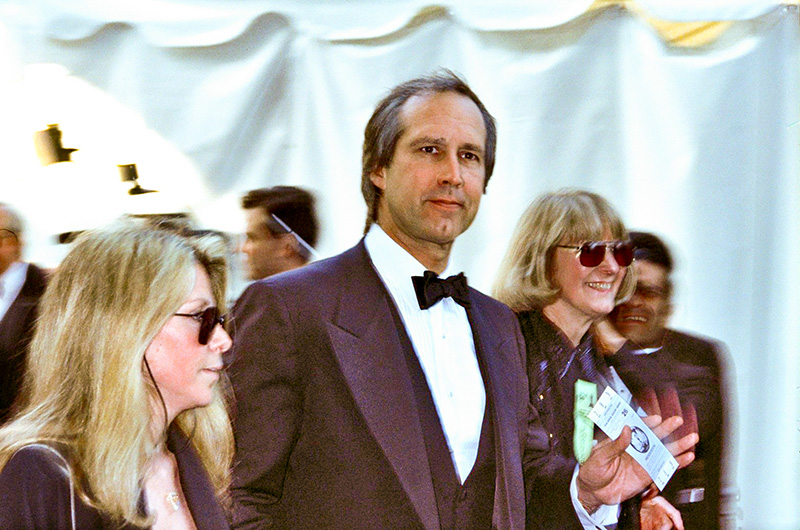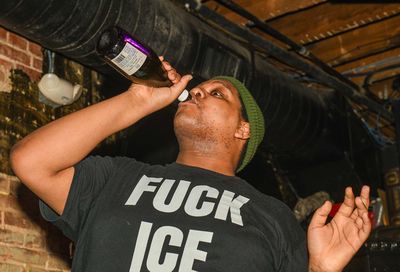Naked Gunn
Bravo's style maven and gay icon, Tim Gunn, opens up about his past challenges and present success
He materialized on the scene in 2004, seemingly out of thin air, this maven of style and taste. The show, Project Runway, was the gilded bottle, and this cultured, refined gentleman with a name befitting a secret agent, its magical genie.
Now, Tim Gunn’s celebrity is firing on all cylinders. He’s virtually omnipresent — with a book (A Guide to Quality, Taste and Style), two TV series (Runway and Tim Gunn’s Guide to Style), and a fashion empire to help run. Why, he’s even popping up on commercials featuring that ultra-uber-maven of homemaking, Martha Stewart. He’s our new style guy. And we can’t get enough of him — largely because he’s instructive, authoritative and completely, utterly accessible. He doesn’t just have charm, he is charm personified.
Even when Gunn shows disdain over a particular fashion option, it’s with a feather’s touch. True, he can be harsh, but he’s no Simon Cowell-like pitbull. Whether mentoring the competing designers on Runway with his signature shout of ”Make it work!” or overseeing a style makeover on a hapless subject for his new Bravo series, Tim Gunn’s Guide to Style, Gunn clearly cares about his subjects.
 Tim Gunn |
A graduate of the Corcoran College of Art and Design, Gunn spent much of his adult career in academia, mostly at the prestigious Parsons The New School for Design in Manhattan, where he eventually took hold of a stagnant fashion department and revived it, bringing it to creative life for both the university and its gifted students.
Gunn left Parsons earlier this year for a post at fashion giant Liz Claiborne Inc., where he serves as chief creative officer, a post created specifically for him by Claiborne CEO William McComb.
”The easiest thing in the world for me would have been to stay at Parsons,” says Gunn. ”I was very comfortable there and very proud of my achievements. I loved my work. I really thought I would retire there.” But the opportunity to be part of the apparel industry, to have formative impact on the style that Gunn had for years observed, was too good to pass up.
Gunn will be in his hometown of Washington this weekend to accept the OUTstanding Individual Lifetime Achievement Award from OUT for Work, an LGBT college student career conference taking place at the Washington Plaza Hotel from Sept. 29 to 30. Gunn is being given the award, says OUT for Work Executive Director Riley Folds, for his ”contributions as an out and open professional in the workplace.”
”I get tearful when I think about it,” says Gunn of the award. ”It’s surreal for me. It’s like having an out-of-body experience. It’s an incredible, incredible, incredible honor.”
A week later, on Saturday, Oct. 6, Gunn will be back, making a special appearance at the HRC National Dinner at the Washington Convention Center.
”It’s an incredible compliment,” he says of being asked to appear at the gala. ”I take our community so seriously. When I think of any kind of oppression towards people who are gay, lesbian, bi, transgendered — what kind of philistines are the people who would do that? If it were not for our community, an enormous part of the whole history of society and culture wouldn’t exist. It simply wouldn’t be there.”
Tim Gunn’s life, however, has not always been a charmed one — his early years in particular were difficult, and he acknowledges the pain in a surprisingly raw, revealing fashion. It’s a rare, exposed side of a man we’re currently turning to for tips on how to live our own lives, as he so very clearly does, with an emphasis on quality, taste and style.
METRO WEEKLY: Let’s start with your early life. Your personal history links directly to Washington.
TIM GUNN: Indeed it does. I’m a fifth generation Washingtonian. I was born in Columbia Hospital for Women, and was raised in Cleveland Park — a beautiful area. At the time — and remember, this was 54 years ago — it felt about as suburban as Father Knows Best. It’s leafy, it’s green, there were lawns to mow. But I can’t say I loved it. I don’t want to paint a horrible picture of my childhood, but I wasn’t the happiest of kids. I was very introspective, very isolated, very introverted and saw a lot of my house because I didn’t leave it very much.
MW: Were you an only child?
GUNN: No, I have a sister who is three years younger to the day. We share a birthday.
MW: Why were you isolated?
GUNN: For the first 15 years of my life I had a really terrible, terrible stutter that caused me to shy away from people in general. It had a very negative impact on me at school. People teased me about it. I was not a popular kid.
MW: Were you aware of being gay at the time?
GUNN: Never! Never! It’s hard to believe since I loved Hollywood glamour and design and art and fashion, and I was jealous of my sister and her Barbie dolls. I was a sports klutz — in fact, a sports hater. I was always the last kid chosen for the softball team at school, that sort of thing.
While I excelled in my studies, I hated, hated school. And I was in more schools as a high school student and as a college student than we would have the time for me to recite. I was constantly dropping out of places, near and at the end of the semester. I had a fear of closeness with people, and when people would try to make friends with me, I’d do things to just derail that possibility or put them off. It’s a curious thing to be where I am in life and look back at my childhood and realize I never really had any close friends. But it helped make me who I am. I don’t look back on [my early years] and think, ”If only something else had happened.” It is what happened and it does make me what I am.
But I have to tell you — and I’ve never talked to anyone about this — I had a serious fear of people who were gay. I thought they were predators upon young men, that there was something wrong with them. I felt frightened about the whole possibility that I might be with one, let alone be one.
MW: Was homophobia expressed in your home?
GUNN: My father was so homophobic that later I thought maybe he was a closet case.
MW: So your internalized homophobia likely was environmentally induced.
GUNN: ”There must be something wrong with it,” that’s what you say to yourself. ”There must be something wrong!” I later discovered that most of the good people are gay. And I’m proud to be among them.
MW: When did the pink light bulb switch on for you?
GUNN: Late. I was in denial for a while — kept pushing it to the back of my consciousness. I was 22 when I had my first experience. It was the early ’70s.
But I’ve never had that moment when I’ve said ”I’m out.” Actually, that isn’t altogether true. I did with my sister. Can I be really blunt with you? I have never ever spoken to my mother about it. Does she know? I guess so. I’ve certainly never played any games with her like pretending I’m dating a woman or anything of that sort. But through most of my adult life she was always saying, ”Oh, I met the loveliest girl, you really should meet her.” And I’m like, ”Mother, please.” But I did come out to my sister in a very emotional session when I was 29. It was at the end of the breakup of a long-term relationship, and I was in such pain and agony, I needed to share it with somebody. She was incredible, absolutely incredible. And I’ll never forget it. I remember what I was wearing, where we were, I remember the weather. I remember everything about that day.
MW: I assume you never came out to your father.
GUNN: No, no, no, no, no. Although I think it was one of his greatest fears, and I think he probably suspected I was. We not only didn’t have a close relationship, but we had an almost antagonistic one. The antagonism was coming from me, not from him. In many ways he was simply a rock and he didn’t waiver. I would frequently say, ”My father doesn’t love me, he doesn’t care about me.” But I will say this about my father: He was always there for me whenever there was a crisis. And boy, did I give him a lot of crises. He was always there for me, unconditional support, not a lot of probing and questioning — just ”I’ll help you through this.”
MW: It’s hard to look at the confident, commanding TV persona you are today, and imagine what you’re telling me.
GUNN: I can say it’s still close enough to me, all that experience, just in terms of memory, that I reflect upon it all the time. I think, ”Wow, have you ever come a long way!” I have to also say that teaching was going to kill me or cure me. I was determined that it wasn’t going to kill me, and eventually, it did cure me. I kind of fell into teaching in a way that it wasn’t a goal of mine, it just happened.
MW: What was your life goal at the time?
GUNN: I was going to be a sculptor. I had a studio in the Dupont Circle area and I sold my work to a couple of collectors. That was going to be my career track. I was tied into the whole Dupont gallery scene.
MW: So somebody owns a Tim Gunn.
GUNN: And I hope it’s in good shape. I worked in a very ephemeral medium — paper and illustration board.
 |
MW: You eventually moved into academia, first the Corcoran, then Parsons School of Design in New York, where you are credited for overhauling the entire fashion department.
GUNN: I had a lot of experiences being a ”Mr. Fixit” — or when I’m not in such a good mood, I’d call it ”The Pooper Scooper.” There was a crisis in our fashion department. The program was suffering from atrophy and the curriculum had barely changed in 50 years. So it was decided to send me in to offer up a curricular prescription that would be implemented in the fall of 2001. It ended up being a tremendous labor of love. It was hugely daunting and hugely unsettling in many ways, but what kept me focused and kept me on a straight and narrow line were the students. What was great is that I didn’t come from the industry, so every time I looked at anything that was new to me I’d ask, ”Why are we doing this?” And when I received an answer that was plausible I was placated. But if the answer was ”It’s the way we’ve always done it”, that wasn’t good enough.
MW: It’s ironic that the Parsons fashion department would be so stagnant, considering the fashion industry changes seasonally and frequently flies on the wings of fad.
GUNN: Oh, it does, absolutely. And that’s one of the things I love about it. And one of the things you can trust about it is that it always changes. The reason it always changes is because real fashion — not just clothing but fashion — happens in a context. It’s a context that’s societal and cultural and historic and economic and political. And what the department of fashion design was at Parsons was not a fashion program. It was a dressmaking school. That’s really what they were doing. There was no real design dialogue.
MW: Were you surprised when Project Runway called?
GUNN: There was a little buzz in the industry about how this awful thing was happening, this reality show about fashion designers. They called and I can remember my tone — in fact, I’m ashamed of it. I was a little haughty and I said that I felt what they wanted to do sounded terrible and that the industry was in enough trouble without a reality show. And they said, ”Oh, please let us come in.” So I reluctantly agreed to see [executive producers] Dan Cutforth and Jane Lipsitz and after five minutes I thought, ”These people are really great. I really like them. I like what they stand for.” They told me that they wanted to use real fashion designers, which instantly placated me. Given the seriousness with which I take this industry, I thought I would really love to do this show with them.
We worked together for six months talking about the characteristics the designers should have and the qualities they should bring to the table. And the one single debate that we had, had to do with whether or not the designers should sew. I said, ”They have to sew.” And they told me that they had learned that designers in the industry don’t sew. And I said, ”Well, of course they don’t, but they know how to.” And they said, ”We were told that we really should have a sample room where there are seamstresses and tailors who implement the designers’ concepts.” And I said, ”You know, if the audience doesn’t see the designers getting literal and/or metaphorical blood all over their hands, they’re not going to believe any of this.”
Advertisement
|
MW: It’s a good thing you changed their minds. Otherwise, it would have stripped the show of much of its drama.
GUNN: It would have killed it.
MW: Your presence on the show is very authoritative, yet very encouraging to the contestants.
GUNN: The honest truth is that I want each one of them to succeed. I know that someone by definition will be [voted] out, but I want all of them to have the opportunity to succeed. Sometimes my words are a little strong and a little harsh. It’s tough love because I want them to know what’s on my mind. And not necessarily to change what they’re doing, because I have tremendous respect for their point of view. But faulty execution is another matter. You don’t want sloppy execution to be a distraction from what the design content is.
MW: Season four premieres in November.
GUNN: It’s the best season yet. People say, ”You always say that,” but it is! The level of designers on the show is at an even higher level than before. It’s simply amazing.
MW: Would you want to be a judge?
GUNN: Never! I wouldn’t give up my role for all the tea in China. I love my role. I just love being with the designers. I love the interaction, I love getting close to them, love understanding them well. But I will tell you that the toll it takes during the judges’ Runway deliberations. I hear what they’re thinking, but I can’t do anything about it. And there are so many times I want to leap up and scream, ”If you only knew what so-and-so went through to achieve x, y and z!”
MW: In addition to Runway, you now have your own Bravo series, Tim Gunn’s Guide to Style. How did you feel about taking center stage?
GUNN: Terrified, to be honest. You feel really exposed. I felt during the taping of Guide to Style that we were achieving our goals, but I wasn’t at all confident that the viewer would have the patience for it, because it’s kind of a tedious journey. Are they going to be interested in the underwear drawer? Are they going to be interested in how we shop? Will the viewer watch and come back? So I was living with a lot of concerns about that.
MW: It’s interesting how quickly television turns people into cultural icons.
GUNN: It is extraordinary. That’s why having it happen after I turned 50 gives me enough perspective on this to know what’s going on and to bracket it in a certain way that allows me to not get crazy or diva-like. I’m deeply grateful for it, and deeply respectful of it. I also realize that I’m deeply vulnerable. I don’t want to disappoint viewers. But if I am going to disappoint them, at least I’ll disappoint them being me.
MW: You’ve left Parsons and are now chief creative officer at Liz Claiborne. So you’re finally in the industry. Are you enjoying that change?
GUNN: I’m thrilled by it. And I won’t trivialize its challenges — they’re great. But I’m part of an incredible team. We’re deconstructing the company and rebuilding it. Coming from outside has a distinct advantage in many, many cases.
MW: This weekend you’re coming to accept an award from the organization Out for Work. At the same time, Washington is hosting ”Out & Equal,” a GLBT workplace conference. On that theme, is it stereotypical to observe that the fashion industry is among the most welcoming of industries to gay people?
GUNN: I find the fashion industry to be nothing if not gay-friendly. And I will be really blunt: I make an assumption about men in the fashion industry that they are gay until proven otherwise. And there are tons of heterosexual men at Liz Claiborne and there are tons of gay men and we all get along beautifully. It’s not like two dogs sniffing each other. It’s just a non-issue.
When I’m at a fashion show and I know someone’s gay and we’re friends, I hug them and I plant a kiss on them. If I know that the person is heterosexual, I shake their hand.
MW: What about during your years at Parsons?
GUNN: In all my years in academia, did I ever talk about being gay? No. Was I closeted? No. Did people assume I was gay? Usually. Did I ever talk to my students about it? Not within a classroom setting.
I never really stood up and said, ”I’m Tim Gunn and I’m gay.” Do I now when its appropriate? Of course, absolutely, and it’s something I’m proud of because it has helped form who I am. And I become touched and quasi-weepy when young men tell me I’m a role model for them. I think that really is the loveliest, most flattering thing in the world I could possibly hear. I take it very seriously.
MW: There’s a stereotype that all gay men have style. Some of us, however, are lacking that so-called style gene. Do you have any tips for style-impaired gay men?
GUNN: My approach to gay men would be the same as to anyone else. Who are you? With whom do you interact? What do you do and how do you want the world to perceive you? I never aim to change anybody, I just want to make them the best for who it is they want to be.
It really is about owning responsibility for how we present ourselves to the world, whatever that may be. Where I get impatient is when people say, ”Oh, I don’t care about how I look.” Well, don’t you think you should? Which is not meant to say that men need to shave every day and always wear a crisply pressed shirt and have a perfect crease in their pants. It’s simply to say: Accept responsibility for how you look. That’s all. There are days I go out to get the newspaper — Sunday morning, I haven’t shaved, I’m in shorts and a T-shirt and a pair of flip-flops and I think, ”God, someone might see me.” And then I think, ”I’m perfectly comfortable about this.” Woe is the day that comes when I feel I have to walk outside in a tuxedo every time I leave the house. And if anybody wants to wrinkle their nose and think, ”He looks like that,” well, we’re all entitled to present ourselves as we choose to as long as we accept responsibility for it.
MW: Is there a perceptible difference between the styles of gay and straight men, or is that just myth?
GUNN: Just generally speaking, I think there is a larger percentage of gay men who really care about how they present themselves, who take care in how they present themselves to the world, than straight men. I was just on a TV show in Chicago and the question was put to me, ”Do women care more about how they present themselves than men?” And I said, ”Well, women, generally speaking, have more experience with this — they’ve been brought up this way.” Yet, there are only two genders on this planet and shouldn’t both be concerned with presentation to the world? It’s certainly true with other species.
But I think there is a style gene in gay men’s DNA that’s pretty profound — and it benefits itself in architecture and product design and graphic design and in all of the areas of art and design.
MW: Can someone have style but no taste?
GUNN: Yes, that can happen. Taste, I really do believe, is societal and cultural because Western taste in general has a different flavor from taste in south Asia.
How style manifests itself is very individual, but it’s individual parts that are synthesized and brought together in some cohesive manner and presented. Whether it’s an outfit, a room, a garden, the interior of a car — whatever it may be, it can’t be identified as one thing. It’s a matter of how one navigates the world. It’s a point of view, one that each of us has. All right, here’s my apartment, it has a style. Would I ever walk into someone’s place and say, ”There’s no style here”? No, I don’t think I would. I would say, ”This style is lacking,” or ”I don’t understand the style,” or ”This style looks half-baked.” But it’s still there in some way. So everyone has style in some sense.
MW: How would you define your own personal style?
GUNN: I’m a traditionalist. I have a great respect and reverence for history, whether that’s the history of menswear or interior design or tableware. I’m much more comfortable with things that have an historic base that’s meaningful and proven than I am with items that are brand new and contemporary. It gives me a sense of depth in my life that may be artificial, but it’s very comforting. I have a lot of antique decorative art and I have a reverence for it. I have had people say to me ”You are so shallow that you revere these objects. You should have a great big fire and see what it’s like to live with nothing.” I would hate that day to ever happen, but if it did, I’d start acquiring all over again. I’m not going to live with nothing. I don’t think I could do that. And while I have the greatest respect for people who live in really minimal environments, I don’t have the discipline to do it. And I frankly wouldn’t want to do it. I like stuff. I like things. And it can’t be just any old thing or any old stuff. They’re things that mean something to me.
Part of it, too, is just a natural inclination of mankind and other species to have a nest in which you feel comfortable, a nest you feel is a safe haven. It’s nothing if not deeply, deeply personal. And this is why, when I walk into the home of someone I’m only meeting for the first time, not only am I looking at them and their manner of presentation, I’m looking at how they live. Because just as our clothes send a message about how we want to be perceived, the environments in which we live send a message about how we want to be perceived.
Tim Gunn’s Guide to Style is currently showing on Bravo. Check local listings. Season 4 of Project Runway debuts on Bravo in November. Gunn’s book, A Guide to Quality, Taste & Style (Abrams Image, $17.95), is available at area bookstores and online retailers.
Support Metro Weekly’s Journalism
These are challenging times for news organizations. And yet it’s crucial we stay active and provide vital resources and information to both our local readers and the world. So won’t you please take a moment and consider supporting Metro Weekly with a membership? For as little as $5 a month, you can help ensure Metro Weekly magazine and MetroWeekly.com remain free, viable resources as we provide the best, most diverse, culturally-resonant LGBTQ coverage in both the D.C. region and around the world. Memberships come with exclusive perks and discounts, your own personal digital delivery of each week’s magazine (and an archive), access to our Member's Lounge when it launches this fall, and exclusive members-only items like Metro Weekly Membership Mugs and Tote Bags! Check out all our membership levels here and please join us today!



























